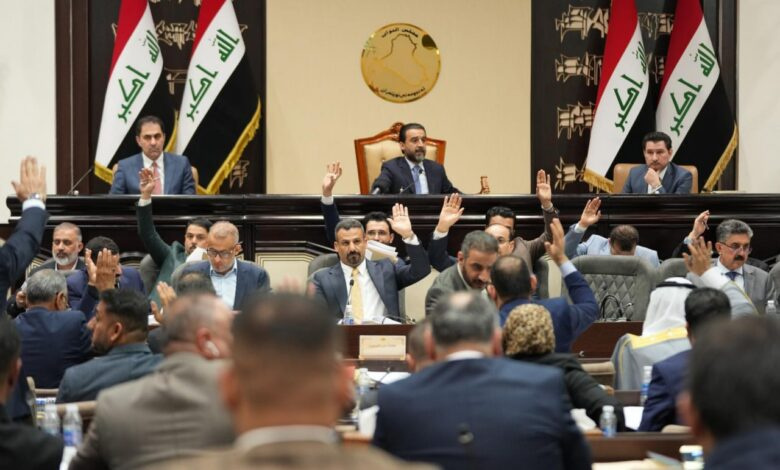The Pros and Cons of Iraq’s Latest Budget

Iraq's government achieved an important milestone when the parliament approved the country's budget last week, sending it to Prime Minister Mohammad Shia al-Sudani for implementation. The prime minister has made it a top priority to stabilize Iraq's political situation and strengthen his government, and the approval of the budget is a significant step in that direction. After intense debates and meetings between various political parties and economic officials, Iraq's budget of $152 billion was approved, marking the first time that a three-year budget has been drafted. This unprecedented budget has the potential to bring economic progress to Iraq.
The projected revenue in Iraq's 2023 budget is $103.3 billion, based on an estimated oil price of $70 per barrel. Oil exports remain the primary source of the country's income, with exports estimated at 3.5 million barrels per day, including 400,000 barrels from the Kurdistan Region in the north. However, Iraq's budget deficit is estimated to be $48 billion, posing a significant challenge for the government.
One of the main challenges in approving Iraq's budget is the dominance of the United States over the global economy, which gives Washington the right to monitor Iraqi government spending through a US-supervised bank account in New York. Under the 1991 oil-for-food agreement, Iraqi government revenues are deposited into this account, and the Iraqi government needs permits from the American government to access the funds from the sale of oil. Despite regular meetings between Iraqi and American officials, obtaining the necessary permits remains difficult, creating a significant obstacle for the Iraqi government.
The Kurds were also dissatisfied with the approved budget, particularly with the allocation of only 12.6% of oil revenue to the Kurdistan Region instead of their initial demand of 17%. While the Kurds can still sell their oil, they need to deposit the revenue in a bank account monitored by the central government, which then deducts the amount from its monthly budget for the Kurdistan Regional Government. Additionally, the Iraqi government refused to pay what the regional authorities consider as arrears, increasing complaints and tensions between the Kurds and the central government.
Despite these challenges, the Iraqi government has defined more than 1200 economic projects that it hopes to implement with the help of the private sector and foreign companies, aiming to link the Iraqi economy with Jordan, Egypt, and Lebanon. The government aims to allocate 150 billion Iraqi dinars for joint projects with Egypt, further boosting Iraq's economic potential. However, the possibility of oil prices falling below $70 per barrel is a significant concern for the government, as it can worsen the budget deficit, forcing them to borrow money.
Another issue that plagues Iraq's budget is the high percentage of salaried government employees. With about 7,800,000 receiving salaries from the government, Iraqi governments have become inflated every year, exhausting the country's budget. To reduce this budget deficit, the government intends to exploit quick-impact projects and attract foreign investment, primarily from Arab countries in the Persian Gulf.
Iraqi government expects to be able to implement many construction projects with this budget, including the South-North Corridor known as the Development Corridor, which starts from Basra and reaches Turkey, the Basra-Shalamcheh (southwest Iran) rail line and the completion of the large port of al-Faw. Additionally, the government intends to solve the electricity problem, reducing the unemployment rate, improving economic growth and activating the private sector in Iraq.
The United States poses a significant challenge to Iraq's budget approval process, as the US dominates the world economy, making obtaining the necessary permits to access the funds from the sale of oil difficult. Another issue is the favoritism towards the Kurds by the US, which Iraqi officials perceive as support for the Kurds against the central government. The Kurds were also dissatisfied with the approved budget, particularly with the allocation of only 12.6% of oil revenue to the Kurdistan Region instead of their initial demand of 17%.
The Iraqi government hopes to implement more than 1200 economic projects, linking the Iraqi economy with Jordan, Egypt, and Lebanon. However, the budget faces several challenges, including the possibility of oil prices falling below $70 per barrel, exacerbating the country's budget deficit. The high percentage of salaried government employees is another issue that exhausts Iraq's budget every year, and the government aims to exploit quick-impact projects and attract foreign investment, primarily from Arab countries in the Persian Gulf.
Despite these challenges, the Iraqi government has defined many construction projects it hopes to implement, including the South-North Corridor and the completion of the al-Faw port. The government also seeks to solve the electricity problem, reduce unemployment rates, improve economic growth, and activate the private sector in Iraq. The approval of the country's budget is a significant achievement for Prime Minister Mohammad Shia al-Sudani, bringing hope for economic progress and stability in Iraq.

